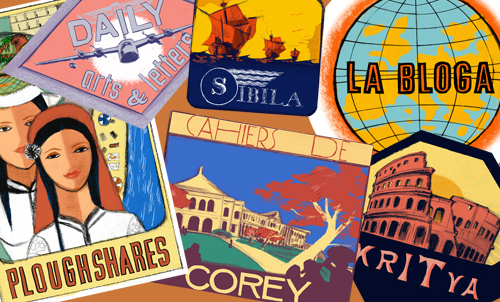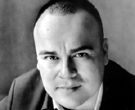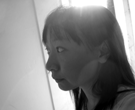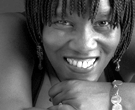Poetry Blog-O-Rama
A roundup of where poets go online.
Introduction
With so many poetry destinations online, it can be tough to know where to start. With the help of fifteen poets, Jessica Winter helps untangle the web.

Illustration by Marianne Goldin.
Note: For brevity, the contributors’ recommendations were edited so that no one destination was cited twice, but sites receiving more than one mention were the Academy of American Poets (Poets.org), La Bloga, From the Fishouse, Jacket, PennSound, Poetry Daily, Reginald Shepherd’s Blog, Silliman’s Blog, and UbuWeb.
 Rebecca Wolff
Rebecca Wolff
Reginald Shepherd is a relative latecomer to the blogosphere, and visiting Reginald Shepherd’s Blog to read his erudite yet egalitarian postings on poetry and poetics is a bit like catching a Luddite pal flipping on the TiVo or slipping on his Crocs. The pleasure of discovering a useful new technology is palpable in his use of it; he discourses widely and wildly, and never self-indulgently.
I like Lime Tree because K. Silem Mohammad includes everything from “The Crises in Poetry” (“most of them [are] attributable to the fact that more or less equally intelligent people disagree with each other violently on questions of value, each side presenting perfectly reasonable arguments”) to Anne Boyer’s cat Ulysses’ preference for Bach over Joni Mitchell. Kasey lives in a friendly universe of other bloggers, and features a fantastic list of fun links. I am sometimes afraid of looking at his blog because it may lead to three hours of Web surfing.
Rebecca Wolff is the founder and editor of the journal Fence, founder of the press Fence Books, and the author of two books of poems, Figment (Norton, 2005) and Manderley (University of Illinois Press, 2001). She is at work on a novel called The Beginners.
 Dan Beachy-Quick
Dan Beachy-Quick
I occasionally go to Joshua Corey’s Cahiers de Corey and follow where the links take me, scanning (a bit shallowly) through the depths of others’ thoughts.
Andrea Rexilius has just begun a new online journal, Parcel, which I think is lovely, and so is Aaron McCollough’s GutCult. Also, Douglas Basford’s Unsplendid, Ethan Paquin’s Slope, Adam Clay’s Typo, Tony Tost’s Fascicle, Jon Thompson’s Free Verse, and Born Magazine all strike me as wonderful.
Maybe my favorite part of virtual poetry life are those people whose love for the work compels them to create a home for it, who evince modest audacity and radical trust that people will visit and read and make the work worthwhile; my most recent favorite is Sam Wharton’s Sawbuck.
Dan Beachy-Quick is the author of three books of poems. He teaches in the Writing Program at Colorado State University.
 Rigoberto González
Rigoberto González
I turn to La Bloga religiously because it’s my lifeline to Chicano/Latino literature: book reviews, interviews, political commentary, discussion forums, and event listings. This blog has worked hard at building community via the web, and there’s never a dull moment since the site is supported by seven amazing artists, each with a distinct voice, focus, and direction. The result is an intelligent spectrum of conversation that breaks down those general assumptions about what a Chicano/Latino reads, writes, or talks about.
Every other day is poet Kate Greenstreet’s series of interviews with first-book authors. The range of temperaments and personalities represented here is what keeps me coming back. Greenstreet is providing an important service to beginning poets, giving them a forum to articulate their fears, desires, disappointments, and surprises before and after the experience of publishing a book. There is at least one important lesson imparted with each entry. Usually five.
I turn to Poetry Daily before I even open my first e-mail—it’s usually more rewarding. I’ve bought more poetry books after browsing the News page than when browsing at the local bookstore.
Rigoberto González is the author of six books, including two collections of poetry. He teaches at Rutgers–Newark and at Queens College.
 Cathy Park Hong
Cathy Park Hong
Action Yes: For their dedication to international poets who, if it weren’t for Action, might never reach American ears (e.g., Czech poet Ivan Blatney, Swedish poet Aase Berg, and Korean poet Kim Hyesoon), their dedication to “de-territorializing” English in poetry, their pithily righteous statements (“Hybridity, Entropy, Inflammation” and “a fine ear is a severed ear”), their forum on the pleasures of excess in poetry (i.e., Jed Rasula’s “Writing the Disaster”), and their arresting Bolshevik design.
2nd Avenue Poetry: For the fact that this experimental magazine has just sprung out of the East Village’s forehead; for the representation of local New York poets such as Jill Magi, Brenda Iijima, and Rodrigo Toscano; and for the swath of strong Asian American poets such as Paolo Javier (the captain of this site), Barbara Jane Reyes, Kazim Ali, and Luis Francia.
Octopus: For their gorgeous and whimsical design, their oft-times illuminating essays, and their dedication to publishing talented emerging poets as well as a few who have been around the block; for their namesake (“a sea creature that is intelligent, lives in dens, and uses ink as a defense mechanism”); and for every issue having some combination of eight.
Cathy Park Hong‘s second collection, Dance Dance Revolution (Norton, 2007), was chosen for the Barnard Women Poets Prize. She teaches at Sarah Lawrence College.
 David Yezzi
David Yezzi
I often check C. Dale Young’s blog, Avoiding the Muse, which is witty and informative. Dale is an oncologist and the poetry editor of New England Review in addition to being a fine poet. He salts his wry observations of the poetry scene with regular news updates as well as personal news and ruminations—always worth the read.
For hilarious, erudite, and elegant rants on poetry and culture, I look forward to the latest E-Verse Radio broadcast—it’s a blog, a podcast, and a videocast.
An excellent resource for English poetry from the medieval period to the Restoration is Luminarium: Anthology of English Literature. If you are looking for poems by Ben Jonson, Fulke Greville, or countless others, they’re here at the click of a mouse.
Perhaps the most impressive, learned, and extensive online poetry resource I know of is the Princeton Dante Project, created by the eminent Dante translator and scholar Robert Hollander. It has the Petrocchi text of The Divine Comedy, Robert and Jean Hollander’s excellent new verse translation, a recitation of the poem in Italian, extensive historical and interpretive notes, and more. Pretty cool.
David Yezzi is executive editor of The New Criterion. His most recent book of poems is The Hidden Model (Triquarterly).
 Annie Finch
Annie Finch
WOMPO, a listserv devoted to a discussion of women’s poetry: Of course I am biased as the list’s founder, but I don’t know of any other site that combines information useful to a contemporary woman poet’s career with essays on foremother poets, resources, and links.
Third Factory gets my vote for a thoughtful, beautifully written, and ingenious site. I like the “Lipstick of Noise” feature, which adds loving, play-by-play annotations to audio poetry clips, and the annual “collectively drawn map of the field.” Third Factory leans strongly toward the experimental, with a gentle curatorial touch that feels objective and welcoming to poets of any persuasion.
Modern American Poetry and UbuWeb are both brilliant large sites. From the Fishouse is a great “audio archive of emerging poets,” and an international site I enjoy visiting is Kritya, a poetry journal edited by Rati Saxena.
Annie Finch is the author of four volumes of poetry and poetry in translation. She is director of the Stonecoast graduate creative writing program at the University of Southern Maine.
 Sarah Crown
Sarah Crown
Interboard Poetry Community has all the poetry news online in one place, plus great boards and a monthly poetry competition. Rus Bowden’s companion blog, Poetry & Poets in Rags, is informative and offers lots of lovely links.
At the Poetry Archive, visitors can listen to poets reading their work, as far back as Tennyson and Yeats. Superb.
The recently revamped Poetry Society site looks beautiful and works seamlessly. Their poetry map of Britain is my favorite feature.
Sarah Crown is editor of Guardian Unlimited Books.
 Francisco Aragón
Francisco Aragón
Eduardo C. Corral, a Chicano poet and Iowa grad whose honors include a “Discovery”/The Nation prize, started a blog a few years ago that’s undergone at least one name change. Early on it was “Asleep Inside an Old Guitar,” the title of one of his poems. Its current incarnation is lorcaloca—an homage to Federico García Lorca. Corral keeps his readers updated on what he calls “tidbits” about the contemporary American poetry scene, and he manages to infuse his posts with a singular and idiosyncratic sense of humor—one that is often aimed at himself as well as others. I use his site as a portal to the rest of the blogosphere.
In the final issue of Sulfur, Eliot Weinberger suggested that Jacket was going to fill the void that the demise of Clayton Eshleman’s print poetry journal would leave behind. John Tranter is well on his way to filling those editing shoes, if he hasn’t already. The sheer volume of materials that Jacket has posted over 10 years and 33 issues—always well-organized, often around particular themes or poets—is consistently lively and engaging. What’s most recently caught my eye and enthusiasm was what I’ll call a “group review” of Brenda Hillman’s latest book. Barbara Claire Freeman gathered pieces by no less than 22 contributors, each honing in on a different poem, in Pieces of Air in the Epic.
Francisco Aragón is the editor of The Wind Shifts: New Latino Poetry (University
of Arizona Press) and author of Puerta del Sol (Bilingual Press). He directs Letras Latinas, the literary program of the Institute for Latino Studies at the University of Notre Dame.
 Sarah Manguso
Sarah Manguso
First click of the day after e-mail, the news wires, and the local weather: Arts & Letters Daily. That was my source for Richard Schickel’s excellent Los Angeles Times essay “Not Everybody’s a Critic.” I agree with everything he writes in that essay about literary blogs.
Second click: New York Times, obituary section. I cherish the obits for their variety and humility. I read them to see what sorts of lives people have; it interests me to see an entire life compressed into a few dozen column inches. I like the obits by Enid Nemy—she doesn’t write many anymore—and Douglas Martin. It may have to do with my interest in compression, to see everything on a page, to fit the whole story in the eye at once.
There are one or two one-man poetry blogs I read periodically to be reminded, by negative example, of the importance of humor, empathy, and generosity of spirit.
Finally, for random lines from the complete works of P.G. Wodehouse, I go here.
Sarah Manguso is the author of two poetry collections, Siste Viator (Four Way Books, 2006) and The Captain Lands in Paradise (Alice James Books, 2002). She is a 2007–2008 Rome Prize Fellow in Literature. Photo by Marion Ettlinger.
 Patricia Smith
Patricia Smith
I had never heard June Jordan’s voice—I’d devoured her poetry, engaged in spirited discussions about her politics, and copied her poems and passed them on to friends, but it wasn’t until I tuned in to PennSound, an archival site committed to preserving the soundtracks we crave, that I heard June’s smoky, slightly bemused performance of “Poem for a Young Poet.” In fact, I was able to listen to an entire reading. Now, whenever I pick up her book, she’s in the room with me. PoetryFoundation.org’s own Kenneth Goldsmith is PennSound’s senior editor, and the site is seriously heavy with language poets, but where else can you hear Barbara Guest, Adrienne Rich, Hilda Doolittle, Lamont Steptoe, and Vachel Lindsay?
To hear poets, I hit PennSound; to see them, I go to e-poets, where you can watch longtime video innovator Kurt Heintz—who turns poems and poetry performances into mini-cinematic gems—strut his stuff.
When my muse deserts me, I call out to her in quirky ways, and here I’ll admit to spending countless hours on the Surrealist Poem Generator, searching for a line just magical or ludicrous enough to get me roarin’ again. Try not to get addicted.
Lately I’ve been surrounded by teenagers, and of course they confound me. For heady glimpses into their world, I love sneaking around Teen Ink, with more than 3,000 poems penned by kiddos age 18 and under. Yes, there’s plenty of angst, self-absorption, and bruising crushes, but—well, there’s plenty of angst, self-absorption, and bruising crushes. I miss my second decade, don’t you?
Patricia Smith is the author of four books of poems, most recently the Paterson Poetry Prize winner Teahouse of the Almighty (Coffee House Press).
 Charles Bernstein
Charles Bernstein
The Electronic Poetry Center features a blog list (edited by Tom Donovan), the Scandinavian Portal (edited by Leevi Lehto), an extensive curated list of poetry, and my own web log.
The English-language Web portal to the international poetry journal Sibila is a gateway to Brazilian poetry.
Eclipse has facsimiles and PDFs of major works of innovative poetry, curated by Craig Dworkin at the University of Utah.
Charles Bernstein is the author of 39 books and is Donald T. Regan Professor of English at the University of Pennsylvania.
 Lynn Emanuel
Lynn Emanuel
Moo*world*order is a blog clearinghouse from the UK, although “clearinghouse” suggests something far too comprehensive for such a massively eccentric site. Here you can find listings for Project Gutenberg (a favorite site of mine) and Michael Kelly’s Page of Misery, which features musings such as “Why I Love Victor Mature’s Eyelids.”
More seriously, Words Without Borders carries articles about and excerpts from non-U.S. writers, and eBooks@Adelaide is a rich collection of e-texts from the University of Adelaide library. I also like SlangSite, a dictionary-in-the-making of college slang; PoemHunter is good because, while the poems are pretty much standard anthology fare, you can download them alongside hilariously bad lyrics from U2: “Hear the children crying / And I know it’s time to go / I hear the children crying / Take me home / Sad song, sad song / Sad song, sad song.”
Lynn Emanuel is director of the Pittsburgh Contemporary Writers Series.
 Lizzie Skurnick
Lizzie Skurnick
The Paris Review site has an alphabetized, searchable online audio archive of readings and interviews—on just the first page of the listings, I found poems by Agha Shahid Ali, Billy Collins, and Jim Carroll.
The BBC’s interviews with poets, though brief, are an incredible time machine for commentary. Try Auden on music and poetry, or Siegfried Sassoon on tableaux vivants.
The Quickmuse reading series pairs authors against each other in live inspiration-battles (for lack of a better phrase), then posts the poetical creations in real time. Watch Paul Muldoon create “Stranded” (and here’s Brad Leithauser’s poem from the same reading).
Lizzie Skurnick is the editor of Old Hag, a literary blog.
 Don Share
Don Share
I read Silliman’s Blog, like lots of other folks do, for the intelligence and for the controversy (get out your popcorn). Great links to other poetry blogs there, too, along with frequent comprehensive roundups of poetry news from every quarter.
Poets & Writers magazine is one-stop shopping for contest deadlines, mainstream how-to articles, and, best of all, “industry shorts” from the publishing world. The Academy of American Poets site has wonderful essays, audio, and event listings—essential stuff.
The esteemed (as he might say) poet and controversialist Bill Knott has a not-for-the-fainthearted blog that is a must-read for me. From his nail-on-the-head analyses of the poetry world to his conspiracy theories, he is a bracing and invigorating presence. And what other notable poet endeavors to make virtually his entire body of work available online for free as downloadable books?
Don Share is senior editor at Poetry magazine.
 Sampson Starkweather
Sampson Starkweather
I check the Ploughshares blog quite often—it’s run by a large group of editors and staff, and incorporates fiction, poetry, nonfiction, interviews with up-and-coming writers, pop culture, mini–literary controversies, cross-genre art, news, debates about poetics, and other hodgepodge.
I also love Julia Cohen’s blog, which is mostly dedicated to reviewing or celebrating books of poems, journals, particular poems, or just beautiful lines or images from those poems—little gifts for her readers. She often writes in a pop-culture vernacular that is impossible to resist, like the last slice of honeydew.
Another blog that I can’t stop reading is Joe Massey’s LiveJournal. The entries are sometimes simply a question (“What is your favorite form of punctuation?”) or, more often, something like this: “If you had to choose one poet to spend the night with in a tent, out in the middle of the desert, with only a strobe light, an extra-large summer sausage, John Denver records, jugs of cheap wine, and several copious containers of glitter, which poet would you choose, and why?”
Sampson Starkweather’s poems and essays have recently appeared or are forthcoming in LIT, Octopus Magazine, jubilat, New York Quarterly, and many other publications.


